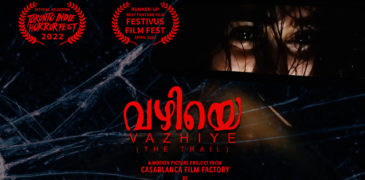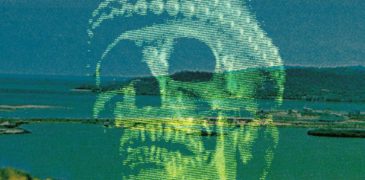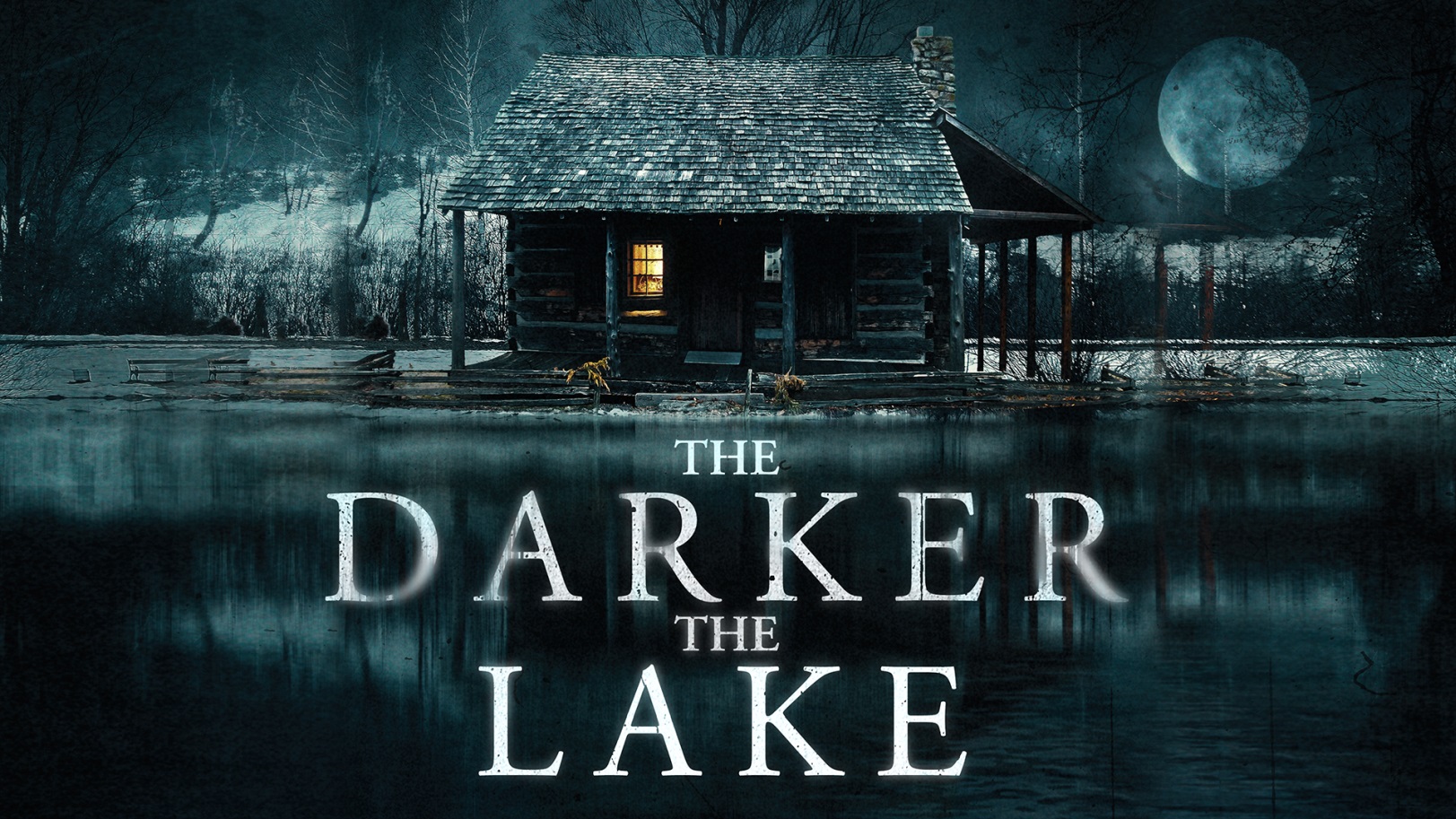
Breathtaking vistas, an Austrian setting, Elyse Levesque as a detective with a slight German accent, a cursed game, and a mix of Nordic noir and supernatural horror elements: this is what The Darker The Lake, the latest movie from director Lok Kwan Woo has to offer. Nordic noir has been an elusive genre when placed out of the hands of non-Scandinavian producers. Does The Darker The Lake prove to be a merrier viewing experience than Tomas Alfredson’s disastrous The Snowman?
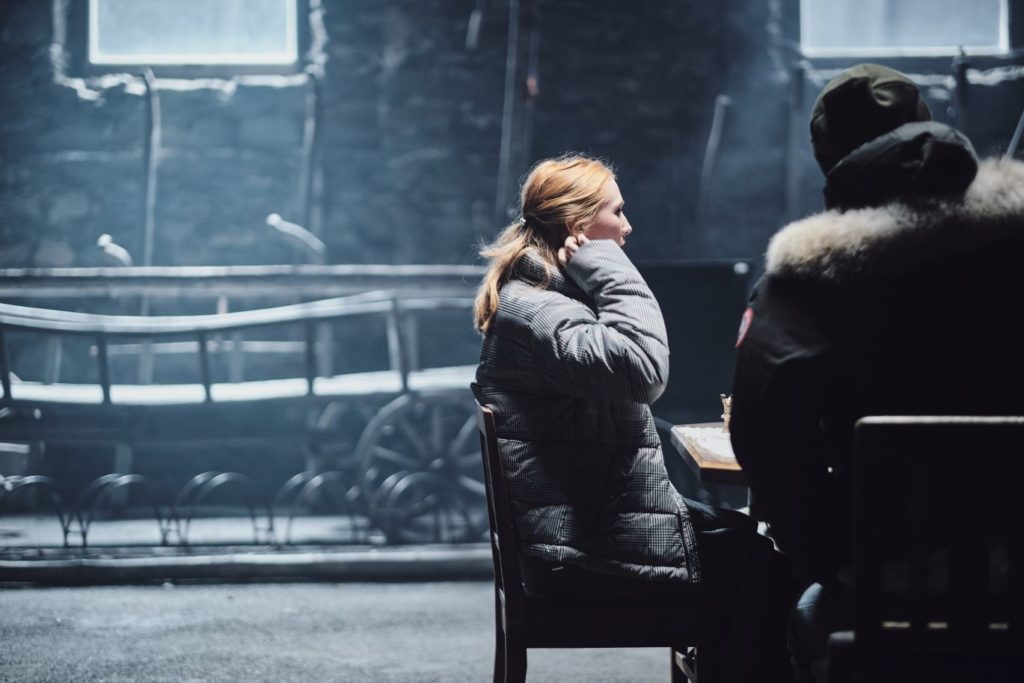
The plot of The Darker The Lake unfolds in two separate timelines: in 1987, five teenagers play a game that’s vaguely similar to that of The Midnight Man. All of them end up dead, except for one: Lea. Fast-forward to 2021, and a string of murders terrorizes the town of St. Michael. On the case are Tamara, Lea’s daughter, and Lukas, her newly assigned partner. Chess pieces are left at the murder scenes, and Lea still seems haunted by a supernatural entity after all these years.
During its first half, The Darker The Lake is more a whydunit than a whodunit, which certainly makes it creepier than your average detective story. As soon the viewer learns the nature of the game, it’s clear that Lea had something to do with the others ending up dead – even her daughter Tamara admits to it in a disappointed tone. “Painkiller” is a supernatural game of tag of sorts with the sole purpose of erasing pain by exacting vengeance. Sounds complicated? It isn’t clear how the game works, although the movie fully describes its rules: “Painkiller” uses chess pieces, cards, a lighter, and a “Timekeeper” (think of Monopoly’s Banker, only armed with a watch). Everyone takes turns describing their revenge fantasies (one of the funniest exchanges is one of the teenagers saying, “I have a vendetta I would like to take off my plate“, only to receive a classic reaction from the others: “You are so dramatic“.) The player with the purest rage gets chosen, and they get their wish – at a huge cost.
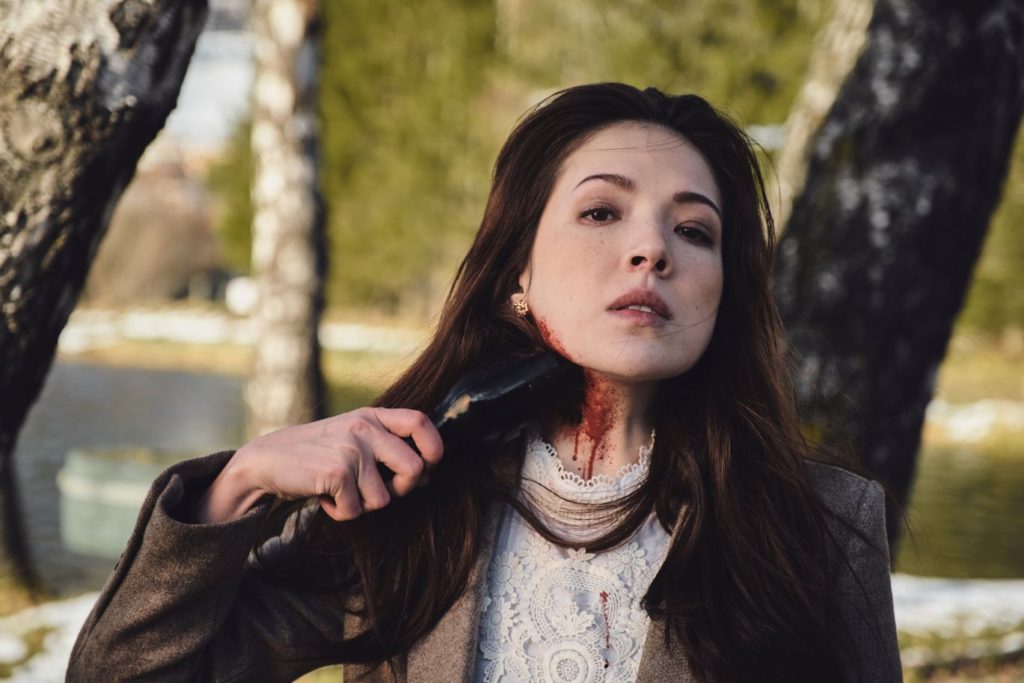
The Darker The Lake‘s themes seem to be the purity of revenge, teenage angst, time, consequences, myths, stories, and beliefs. The watch is a recurring motif that becomes extremely important to the plot in the movie’s second half. The pettiness of the teenagers’ actions in the 1987 flashbacks is apparent, as they try to cheat their way to Sunyata – a common concept in Buddhism and yoga which refers to emptiness as freedom from distractions. The concept of a story-entity is also played with, (one similar to how the deities of American Gods function) a story that becomes deadly if most of the town’s inhabitants believe in it. Last but not least, the central mother-daughter relationship is a fraught one, as would seemingly befit a detective in most Nordic noir affairs (Saga Noren from “The Bridge”, arguably the most recognizable such fictional character, is socially awkward at best, an emotional wreck at worst).
Let’s make one thing clear: the movie is not a perfect project, by any means. It suffers from occasionally stilted dialogue and it has a habit of relying on info-dumps, even visual info-dumps in the form of entire pages for the viewer to read through. If docufictions like Ms Slavic 7 proved that there is a way that pages of text can be integrated into the film if given the proper context, emphasis and design, the ones in Darker appear out of nowhere and are mostly ill-timed. For maximum enjoyment, the viewer will have to press the pause button as soon as a large piece of text enters the screen or miss out on potentially vital information.
However, The Darker The Lake is also one of the best-looking indie horrors of the year: even if the high-def resolution isn’t always the best choice, the filmmakers make the most of it here, and they clearly had access to the necessary equipment: gorgeous high-def photography, stunning color grading that seems to entirely adhere to a “wintery” preset, great use of shadows, framing, proportions, and composition. There are some shots that could stand on their own in a photography gallery, and it’s obvious that the film’s crew, or maybe just cinematographer Alexander Aigner, are better at math than most. The production design, location management, and make-up departments also shine and are vital in establishing the movie’s look and feel.
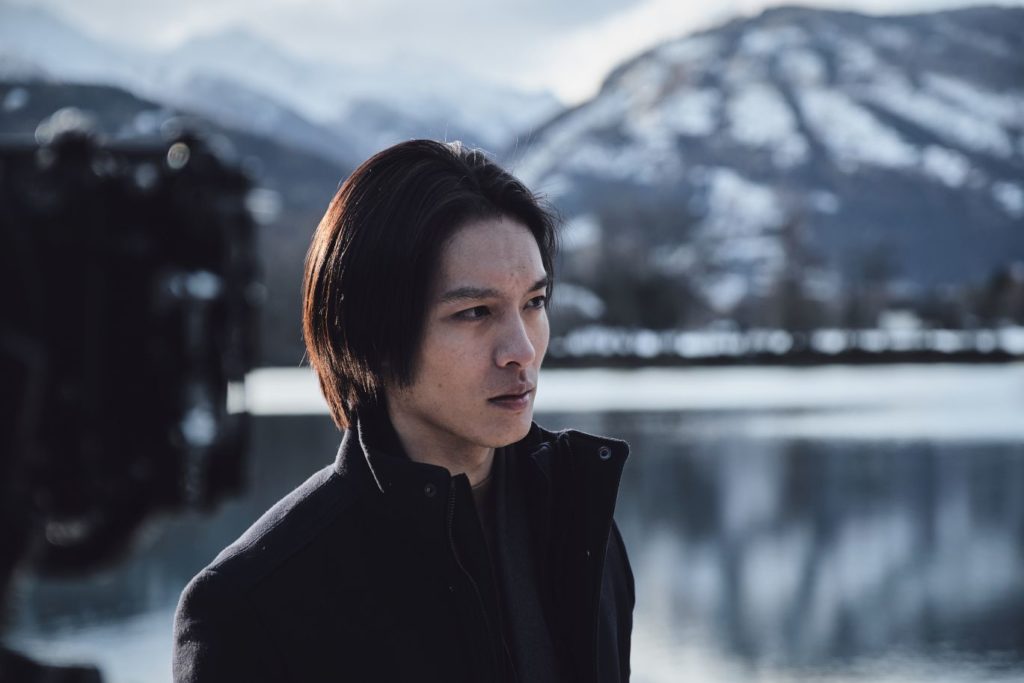
Horror fans who care more about the plot or character development than the visual feast offered by The Darker the Lake will perhaps be bothered by some inconsistencies: it’s not clear why Lea isn’t being held in custody when she does come across like the initial villain of the story, or why the detectives aren’t more skeptical when they learn of supernatural games. The characters, except for Tamara, aren’t really fleshed out beyond “victim”, “intelligent at just the right time” or “having ulterior motives”. Levesque, after proving she can work an axe and play a compelling villain in both Pilgrim and Ready or Not, ensures that Tamara is a protagonist to root for, delivering a nuanced performance. Her character is a slight subversion of the “dysfunctional female lead detective”, and your mileage may vary on the performances of other actors.
Given that the viewer is able to embrace the Nordic noir elements more than the horror ones, there is a lot to like about what The Darker the Lake manages to pull off in its third act. If The Awakening was a movie that shook off its skeptic roots through its finale, this one is the complete opposite. The surprises it provides ever since a new character – a myths and beliefs writer – makes his appearance are delicious, providing a scientific and psychological core to the movie that is absolutely fascinating. The discussions about infrasound, fear frequencies, and “chosen one narratives” are so impressive, and the chess motif so apt that one almost wishes The Darker the Lake had been a 6-episode miniseries so those concepts would have been fleshed out more. The film not only becomes effective in its final moments both as a whydunit and as a whodunit, but the entire ending scene is a hard one to shake off. Because of the finale’s power, second-guessing the movie’s intentions and checking for plot inaccuracies and retcons becomes a rather futile gesture – this film marches to its own beat, and one either takes it “as it is”, or will probably end up rejecting its offer.
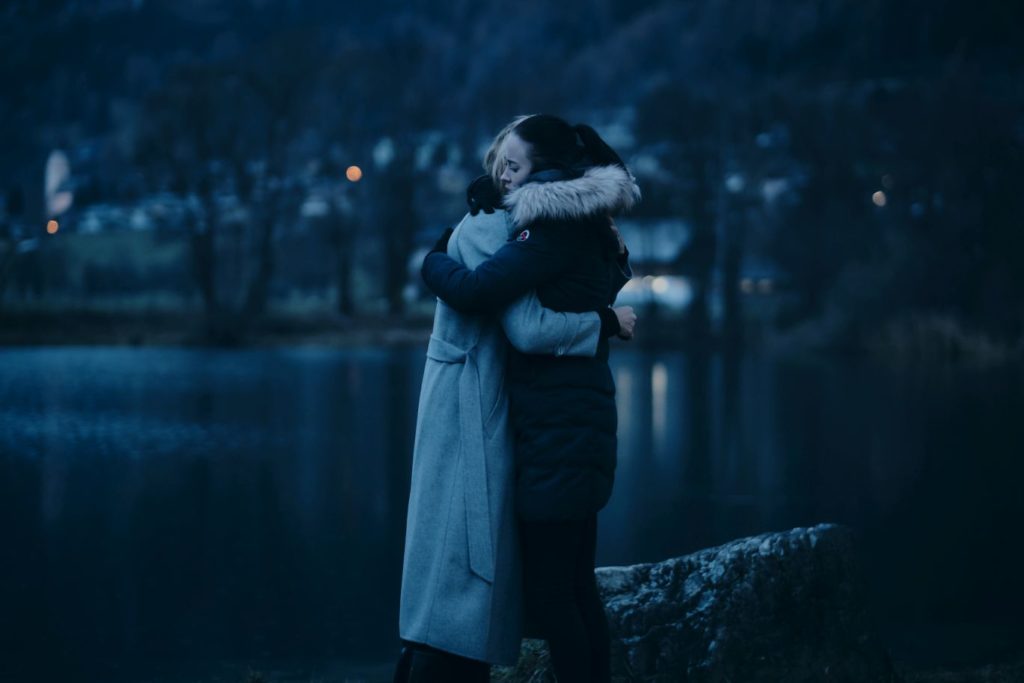
Ultimately, The Darker the Lake has an unusual structure but makes for a satisfying experience if one is able to forgive its inconsistencies and follow in its path. The plot twists it has in store for both fans of supernatural horror and Nordic noir work wonders. It manages to pull off an ending that is both shocking and fulfilling, scary yet hopeful at the same time. Even if the script and the dialogue aren’t always up to par, one could get lost in the chilly atmosphere and the beautiful photography. The locale is used to its maximum efficiency and the movie just zips from scene to scene as if they were rooms in a point and click adventure game – as such, we can only commend the team behind this one for not playing it safe and managing to come up with something completely novel.
The Darker The Lake is released on digital on 21 March 2022 from (Yet) Another Distribution Company and 101 Films.
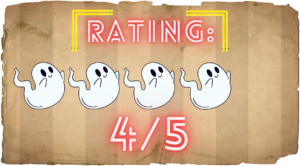
More Movie Reviews
To be the first at anything is always an exciting prospect, particularly when that label becomes exponentially less attainable with time. While there have been a few found footage films… Returning to the site of a hotel where the aboriginal people slaughtered a team of archaeologists, a new team set forth to find out the truth of what happened to… Stanleyville (2021) has a simple premise: five contestants compete in a contest to win a brand-new habanero-orange compact SUV. Maria joins hoping for a chance at transcendence, but the other… It may seem odd to call a film as austere and violent as Undergods beautiful, with its bleak tones against a setting reminiscent of Cold War Era Brutalist architecture, all… From the dawn of humanity’s time on this Earth, fear has been the most important feeling for the survival of man. It is what keeps us alive, the reason we… Mercenaries for hire, James and Marshall are tasked with rescuing a scientist from an underground bunker in order to obtain the research she holds. However, the complex is crawling with…Vazhiye (2022) Film Review – A Found Footage Horror First
Jungle Trap (2016) Film Review – Do You Know Where You Are?
Stanleyville (2021) Film Review: Is the Car Really Worth It?
Undergods (2020) Film Review: Beautiful and Brutal Art House Horror
Celebrating The Best Hidden Gems of The Found Footage Horror Genre (Part 1)
Death Valley (2021) Film Review – Action Packed Horror
